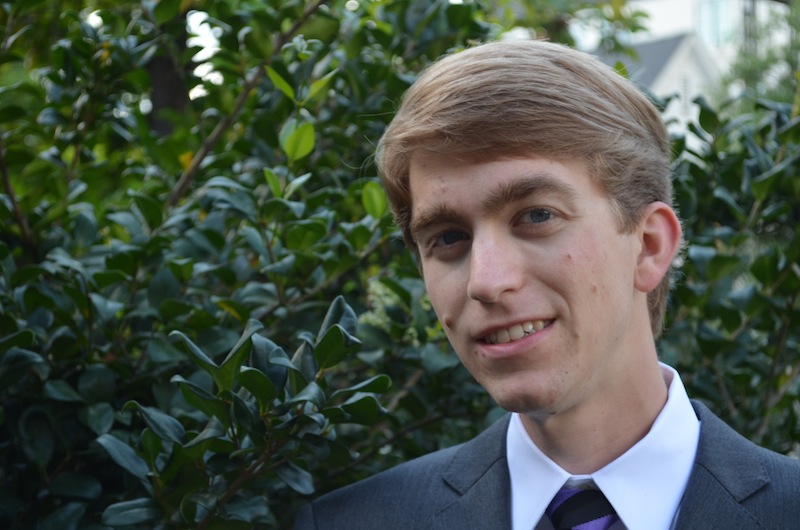Whitman settings fare best in Secret Opera’s evening of staged song cycles
We are at an interesting moment in American opera: even as the struggles of our large companies dominate the press, a number of smaller experimental outfits are flourishing. In New York, even in the aftermath of the untimely demise of Gotham Chamber Opera, such ensembles as LoftOpera, Heartbeat Opera, and Experiments in Opera continue to lead the way in maintaining a vibrant scene off the beaten path.
Coming up on its second anniversary, one of the youngest of these is The Secret Opera, whose primary focus so far seems to be on new small-scale dramatic works. Their spring presentation, which received its final performance on Saturday evening was “In Their Own Words,” three staged song-cycles taken from texts by A. E. Housman, Walt Whitman, and Virginia Woolf, all of whom struggled with repressed sexuality during their careers.
As in many concerts with a prescribed concept, the theme was lost somewhat in performance, but that apart, Saturday’s program presented compelling performances of three emotionally charged works for voice and accompaniment at South Oxford Space, a cozy venue in downtown Brooklyn.
There was admittedly a feeling of unevenness about the program: Marcus Crawford Guy’s economical stage direction, which tethered the three singers in turn to a beaten-up writing desk, felt sometimes aimless, most of all during He Would Not Stay, the setting of seven Housman poems that opened the evening.
Joseph Rebman’s cycle, premiered in 2014, was not exactly a complete whole, but each was a compelling song in its own right. The writing for piano in the first, “He would not stay for me,” had a toybox sort of simplicity, paired with lovely, direct melodic writing for the voice. There was an impressive variety to Rebman’s writing, which showed a more agitated side in the second poem, “Shake hands,” and presented evocative, flute-like piping on the piano in “The street sounds to the soldiers’ tread.” His tonality feels rooted in twentieth-century neo-Romanticism.
In performing Rebman’s cycle, Matthew Walsh showed a smooth, smoky baritone and consistent tone. One could smell the salt air in “Oh were he and I together,” as an open, windy accompaniment prickled at the top of the keyboard. The sixth song, “When he’s returned I’ll tell him,” was a beautiful, moving lament, reaching up to the top of Walsh’s range for a startling moment of intense sorrow. Dmitry Glivinskiy was a solid collaborator, playing ably on a piano that badly needed tuning.
The program’s largest item was Dominick Argento’s cycle From the Diary of Virginia Woolf, but in this realization it proved the least satisfying of the program’s offerings, despite being the only one by an established composer. Argento’s writing has a tendency to meander in introspection, though it certainly has its moments of arresting directness–the music became suddenly, fervently focused in “Anxiety,” and “Parents” showed tugging, teary melodic writing while close harmony subtly altered the color of the sound.
Argento’s writing excels in its smallest gestures, and in that regard mezzo-soprano Caitlin McKechney was at her best as well, finding nuance in small moments, such as the crushing final line of “Hardy’s Funeral.” She often sounded overmatched by the material–she has a huge voice, but had a hard time controlling it, revealing hard edges and not producing a consistent tone. Still, she was impressive in her ability to chart a compelling course through this piece, creating a vivid character that she stuck to from beginning to end.
The most powerful offering was Ross Griffey’s set of Three Whitman Songs, given here by the mezzo-soprano for whom they were written, Hannah McDermott. Again, Griffey’s writing clearly comes out of the Romantic tradition, here employing lush harmonies for the inventive instrumentation of cello, harp, and oboe. “Among the Multitude,” the cycle’s first installment, featured gorgeous, pining writing for the oboe and impressionistic blurring for the harp.
McDermott herself has a powerful instrument, and while she sometimes struggled to find a full body to her sound, there is a unique spice in her tone and she phrases wonderfully, suggesting nuanced emotion in her reading of the music’s lines. Her interpretation treated these songs as though they might have been dramatic monologues from an opera: she was fully committed, even though the staging was relatively minimal.
There was a more darting feel to the writing in “That shadow my likeness,” which searched frantically for direction, and called for notes that truly lay above McDermott’s comfortable range. She sang with remarkable urgency in “To a Stranger,” which was more firmly modernist in its idiom, but still richly lyrical.







